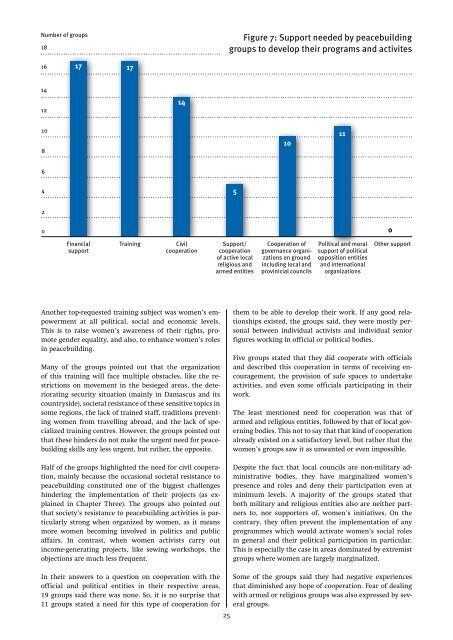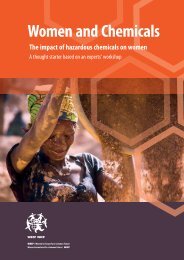future now”
YAO19
YAO19
You also want an ePaper? Increase the reach of your titles
YUMPU automatically turns print PDFs into web optimized ePapers that Google loves.
Number of groups<br />
18<br />
Figure 7: Support needed by peacebuilding<br />
groups to develop their programs and activites<br />
16<br />
17<br />
17<br />
14<br />
12<br />
14<br />
10<br />
8<br />
10<br />
11<br />
6<br />
4<br />
5<br />
2<br />
0<br />
0<br />
Financial<br />
support<br />
Training<br />
Civil<br />
cooperation<br />
Support/<br />
cooperation<br />
of active local<br />
religious and<br />
armed entities<br />
Cooperation of<br />
governance organizations<br />
on ground<br />
including local and<br />
provinicial councils<br />
Political and moral<br />
support of political<br />
opposition entities<br />
and international<br />
organizations<br />
Other support<br />
Another top-requested training subject was women’s empowerment<br />
at all political, social and economic levels.<br />
This is to raise women’s awareness of their rights, promote<br />
gender equality, and also, to enhance women’s roles<br />
in peacebuilding.<br />
Many of the groups pointed out that the organization<br />
of this training will face multiple obstacles, like the restrictions<br />
on movement in the besieged areas, the deteriorating<br />
security situation (mainly in Damascus and its<br />
countryside), societal resistance of these sensitive topics in<br />
some regions, the lack of trained staff, traditions preventing<br />
women from travelling abroad, and the lack of specialized<br />
training centres. However, the groups pointed out<br />
that these hinders do not make the urgent need for peacebuilding<br />
skills any less urgent, but rather, the opposite.<br />
Half of the groups highlighted the need for civil cooperation,<br />
mainly because the occasional societal resistance to<br />
peacebuilding constituted one of the biggest challenges<br />
hindering the implementation of their projects (as explained<br />
in Chapter Three). The groups also pointed out<br />
that society’s resistance to peacebuilding activities is particularly<br />
strong when organized by women, as it means<br />
more women becoming involved in politics and public<br />
affairs. In contrast, when women activists carry out<br />
income-generating projects, like sewing workshops, the<br />
objections are much less frequent.<br />
them to be able to develop their work. If any good relationships<br />
existed, the groups said, they were mostly personal<br />
between individual activists and individual senior<br />
figures working in official or political bodies.<br />
Five groups stated that they did cooperate with officials<br />
and described this cooperation in terms of receiving encouragement,<br />
the provision of safe spaces to undertake<br />
activities, and even some officials participating in their<br />
work.<br />
The least mentioned need for cooperation was that of<br />
armed and religious entities, followed by that of local governing<br />
bodies. This not to say that that kind of cooperation<br />
already existed on a satisfactory level, but rather that the<br />
women’s groups saw it as unwanted or even impossible.<br />
Despite the fact that local councils are non-military administrative<br />
bodies, they have marginalized women’s<br />
presence and roles and deny their participation even at<br />
minimum levels. A majority of the groups stated that<br />
both military and religious entities also are neither partners<br />
to, nor supporters of, women’s initiatives. On the<br />
contrary, they often prevent the implementation of any<br />
programmes which would activate women’s social roles<br />
in general and their political participation in particular.<br />
This is especially the case in areas dominated by extremist<br />
groups where women are largely marginalized.<br />
In their answers to a question on cooperation with the<br />
official and political entities in their respective areas,<br />
19 groups said there was none. So, it is no surprise that<br />
11 groups stated a need for this type of cooperation for<br />
25<br />
Some of the groups said they had negative experiences<br />
that diminished any hope of cooperation. Fear of dealing<br />
with armed or religious groups was also expressed by several<br />
groups.



